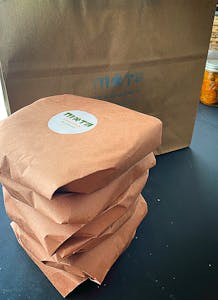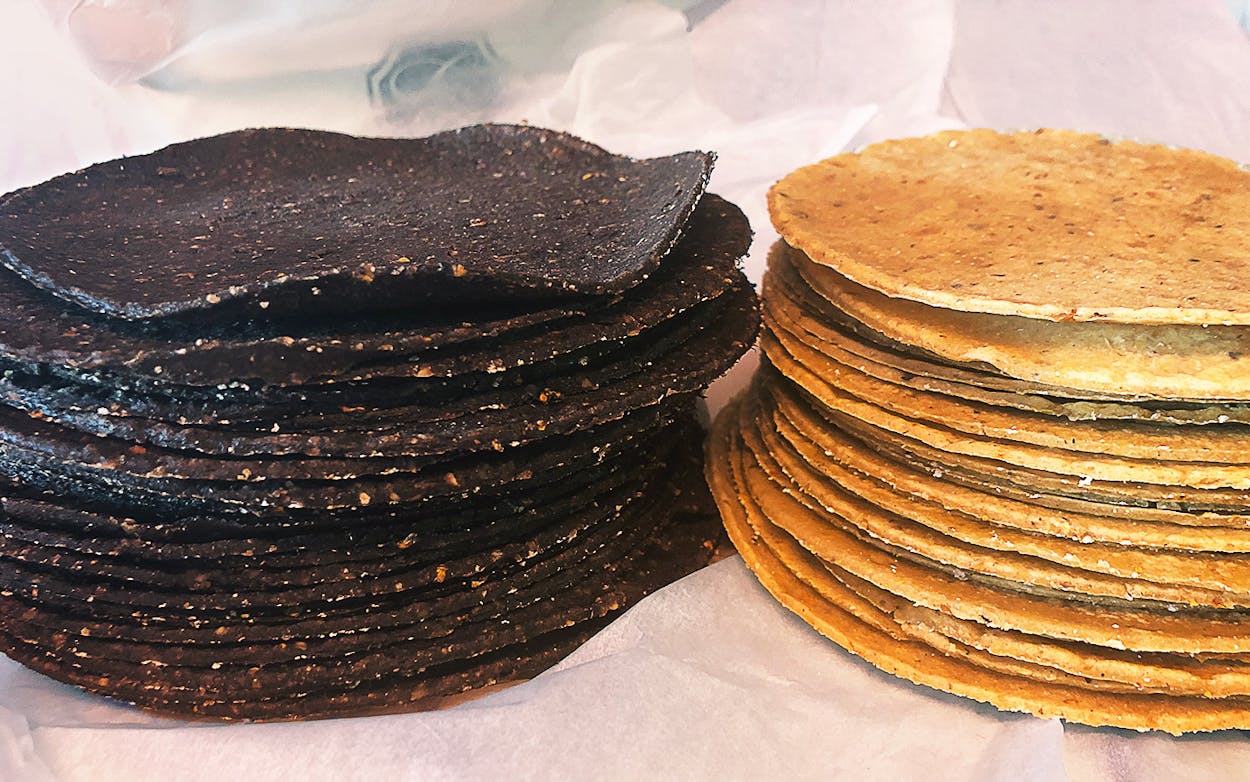On April 23, packages of heirloom Oaxacan blue corn tortillas hit the shelves at Salt & Time, a market in East Austin. Handmade at Nixta Taqueria, they sold out within an hour. Chef Edgar Rico, who co-owns the taqueria with Sara Mardanbigi, was surprised. “The next day, they sold out in an hour again, and that was after we doubled production,” he says. Sales are now holding steady at twelve dozen a day.
Selling tortillas had always been part of the plan, Rico says, but now he’s especially thankful for the new revenue stream—which he and Mardanbigi decided to launch when the COVID-19 pandemic hit Austin. The Salt & Time account has increased business by 8 to 10 percent, according to Rico—not an incredible windfall, but enough to make a difference. “It allows us to keep some of our staff employed, especially those who are unable to receive unemployment or who wouldn’t be receiving a stimulus check due to their [immigration] status,” Rico says. “For us, it was a necessity to keep them employed, and working by any means possible.”

Made every morning in Nixta’s tiny kitchen, packages of twelve of those beautifully textured discs—redolent of corn sourced from Agropa, a Houston-based purveyor of Mexican ingredients—go for $12 at Salt & Time. This is a surprisingly low price point considering the many hours of work that go into their production. The preparation begins the night before with nixtamalization, which is the foundation of everything Nixta Taqueria does, the reason it’s one of Austin’s most popular taco spots, and the inspiration for the restaurant’s name. Briefly, nixtamalization is the millennia-old process by which corn is cooked and soaked in an alkaline solution that separates the outer hull from the rest of the kernel and releases trapped nutrients. Afterward, the corn is ground or milled into a dough that’s rolled into balls and then pressed into tortillas.
I call nixtamalization “the hard way.” It takes passion and dedication to tradition to continue the practice of such tortilla production, and the result is a deep contrast to the often rubbery, bland commodity tortillas sold on supermarket shelves or produced in large urban tortilla factories. Compared with those, a good nixtamal tortilla is near-perfect. All that’s needed, if anything is needed at all, is a sprinkle of salt on the open tortilla. Roll up the disc, and munch on it like a snack—a taco even. There are names for this. One is whimsical: a taco de nada (a nothing taco); the other is matter-of-fact: taco de salt (a salt taco). The sodium crystals buoy the natural corn flavor of the tortillas. It’s heaven.
The passion that drives Rico, Mardanbigi, and their staff created a demand for the tortillas straight from the restaurant since Nixta Taqueria opened last October. “Our priority was always to make sure that we had enough for service,” Rico says. Occasionally, the staff would advertise extra tortillas for sale via the restaurant’s Instagram page. “Then any stragglers we would sell, or if anyone placed an order we would have them pick up on Tuesdays or Wednesdays, since the weekdays were a little less hectic.”
Now Nixta Taqueria’s tortillas are available during operating hours Tuesday through Sunday via online ordering, whether for contactless pickup or delivery. (The dining room remains closed because of COVID-19 concerns.) That being said, the number of tortillas sold directly from the restaurant is limited to about six dozen packages per day. “We’re just trying to be a little more nimble,” Rico says. “You always have to have another way to diversify your brand.”








